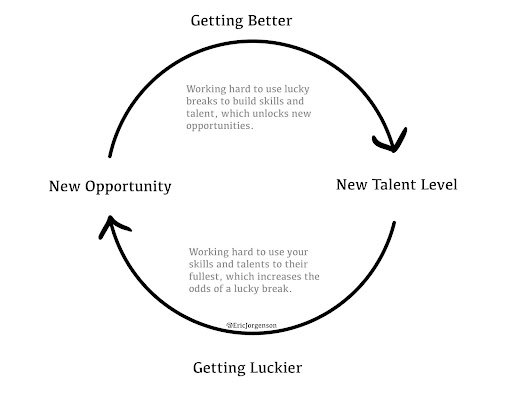The Lucky-and-Good Feedback Loop
At the end of “How I Built This” podcast episodes, Guy Raz asks “How much of this good outcome came from your skills and your talent, and how much would you attribute to luck?”
Guests always rush to acknowledge how lucky they were, and how important it is to work hard.
“The harder you work, the luckier you get” is a common reference. This is close to the truth, but we can do better:
There is a feedback loop between being good and getting lucky.
A successful outcome requires both luck and skill. Most people can see that skill comes from hard work. Fewer people acknowledge this: good luck often comes from skill.
Skill, Luck, and Feedback Loops
The lucky-to-good feedback loop is what drives truly great outcomes.
A successful career in any pursuit is built from many opportunities, attempts, and victories. Each small win exposes you to a little more luck. And each lucky break allows you to build more skill.
You’ll notice that both pursuits involve hard work.
How do you build skills? Use every opportunity you have to develop skills, and work hard through deliberate practice.
How do you get lucky? Use every opportunity you have to display your talent, your ambition, and your hard work. Manifest opportunities by making your wishes known.
Is getting a great investor to fund your company luck? Maybe meeting one particular investor was serendipity, but the hard work of building an investible company is a learnable skill.
When that investor gives you capital, it gives you the opportunity to increase your skills and the value of your company. Increased skills mean more exposure to luck – more time to find, align, and capitalize on the next opportunity.
Maybe the next opportunity is a big customer who approaches because they think you can solve their problem. Luck… earned by the hard work you’ve already put in. Capitalize on that opportunity, and you become a more skilled entrepreneur with a more valuable company.
It’s all a feedback loop.
If you get stuck on one side or the other, you eventually plateau.
You can practice guitar in your own apartment every day until you are a virtuoso – but if you never go play a gig, post a video, or busk a street corner no one will ever know to offer you the next opportunity.
The faster you drive these loops, the more progress you make:
The Lucky-and-Good Feedback Loop is everywhere
In Silicon Valley, people often say: “You know you have Product-market fit when ‘unexplained good things happen’ – customer growth, inbound applicants, customers trying to invest in your company.”
Those things individually sound like strokes of luck – but they were earned and deserved by the previous hard work of discovering and building a product that customers loved.
Folk wisdom also supports this view of the world.
"God helps those who help themselves"
“Luck favors the prepared mind”
“Fortune favors the bold”
Which are all romantic, slightly-too-vague approximations of the useful truth:
There is a feedback loop between being good and getting lucky; getting lucky and being good.

